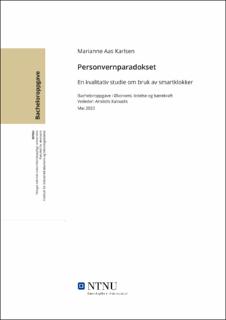Personvernparadokset – En kvalitativ studie om bruk av smartklokker
| dc.contributor.advisor | Kaloudis, Aristidis | |
| dc.contributor.author | Karlsen, Marianne Aas | |
| dc.date.accessioned | 2022-07-08T17:20:10Z | |
| dc.date.available | 2022-07-08T17:20:10Z | |
| dc.date.issued | 2022 | |
| dc.identifier | no.ntnu:inspera:106261294:30593607 | |
| dc.identifier.uri | https://hdl.handle.net/11250/3004155 | |
| dc.description.abstract | Flere og flere tar i bruk smartklokker og for mange er smartklokker et nyttig og motiverende hjelpemiddel for å holde seg i form og bidra positivt til egen helse. Samtidig genererer smartklokkene mye data, noe som tilsier at smartklokkeprodusentene høster stort volum av persondata og hvor deler av disse er å anse som helseopplysninger. Formålet med studien er å forstå hvilke vurderinger smartklokkebrukere gjør i forhold til bruksverdien av de sensitive persondata som smartklokker genererer. Gjennom oppgaven blir man kjent med begrepet personvernparadokset som forklarer gapet mellom den bekymring vi har om informasjon vi deler om oss selv og ønsket om et sterkt personvern slik at våre data ikke kan misbrukes. I kombinasjon med personvernparadokset legges det til grunn følgende tre teorier; teorien om planlagt atferd, teorien om rasjonell uvitenhet og teorien om beskyttende motivasjon. Seks informanter ble intervjuet ved hjelp av en semistrukturell intervjuguide. Ikke overraskende bryr informantene seg lite om brukervilkår og personvernerklæringer. Derimot er de bevisste på å styre tilgang til data gjennom aktive valg av innstillinger i smartklokkenes digitale grensesnitt. Det som var overraskende i studien, var en utbredt «jeg har intet å skjule»-holdning. Ingen av informantene klarte å komme på utfordrende scenarioer som indikerer hvordan deres helseopplysninger kunne bli misbrukt. Studien gir et tydelig uttrykk for at informantene ikke er bekymret for helseopplysninger som ens smartklokke genererer. Ei heller forventer de at helseopplysningene har noen bruksverdi for andre aktører. Konklusjonen er at det ikke eksisterer noen personvernparadoks i denne studien. | |
| dc.description.abstract | The number of people using smartwatches is rapidly increasing. Smartwatches can be a useful tool in motivating us to stay in shape, and hence contribute positively to our health. Nevertheless, smartwatches generate a lot of data, which enables manufacturers to harvest a large amount of personal data, including sensitive health information. This thesis studies smartwatch users and their understanding regarding the value of the sensitive personal information that their smartwatches generate. Through this thesis, one becomes familiar with the concept of the privacy paradox, which describes the gap between our concerns regarding privacy and our behavior to share information online. In combination with the privacy paradox, the following three theories will lay the groundwork for the thesis; theory of planned behavior, theory of rational ignorance, and the protective motivation theory. Through a qualitative study, six informants were interviewed in the form of a semi-structured interview. As expected, the informants did not care much about the terms of use and the privacy statement when it comes to the use of smartwatches. On the other hand, they are very conscious of restricting access to data using available user settings. Surprisingly, there was a widespread «I have nothing to hide»-attitude. This attitude further led to no one being able to come up with any particularly challenging scenario on how their sensitive health information could be misused. None of the informants feels worried about the health information that one’s smartwatch generates and do not expect the health information to have any value for other companies. Conclusion; there is no existence of privacy paradox in this thesis. | |
| dc.language | nob | |
| dc.publisher | NTNU | |
| dc.title | Personvernparadokset – En kvalitativ studie om bruk av smartklokker | |
| dc.type | Bachelor thesis |
